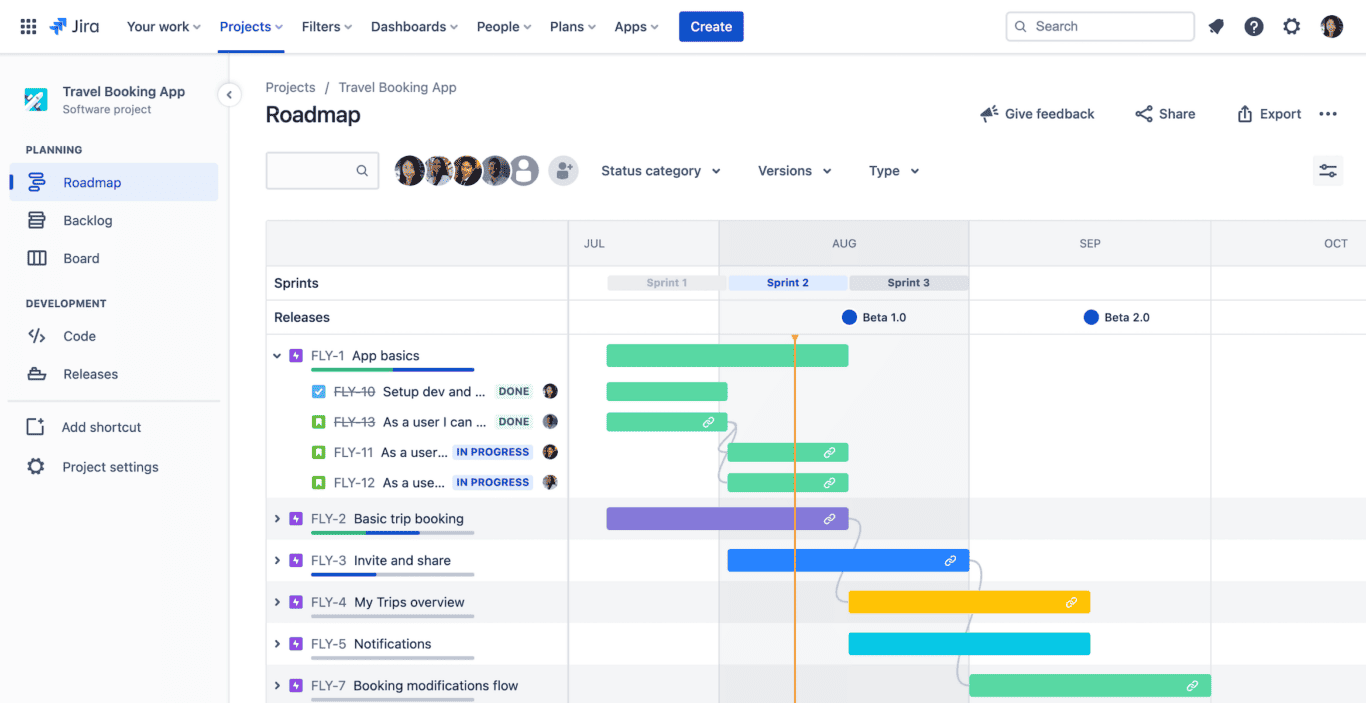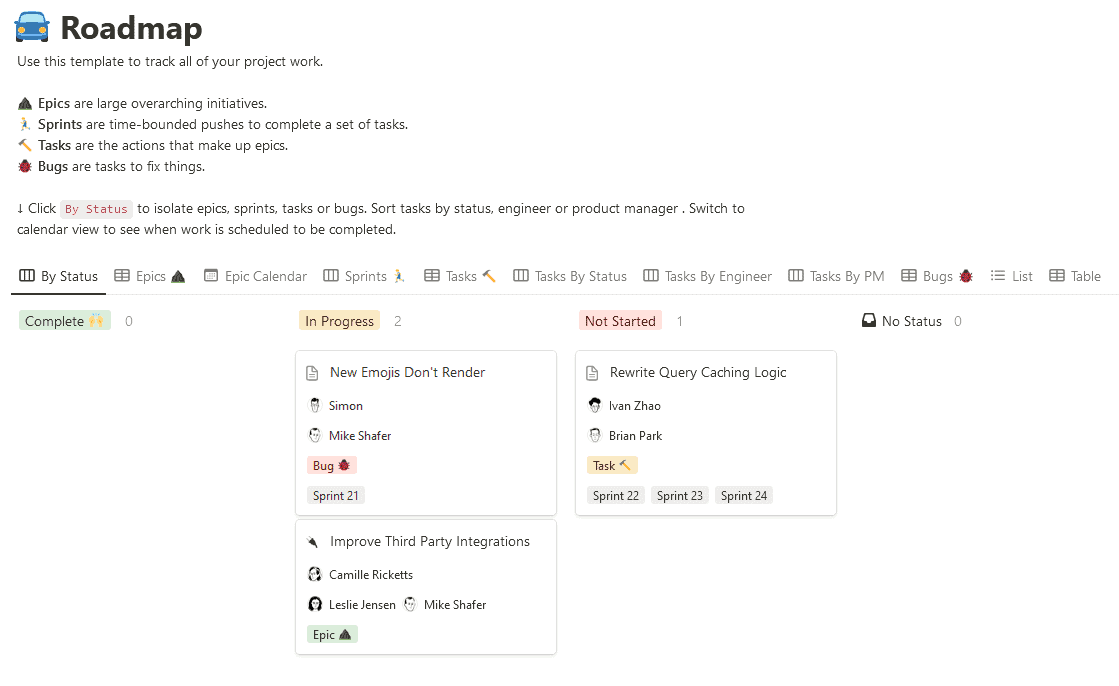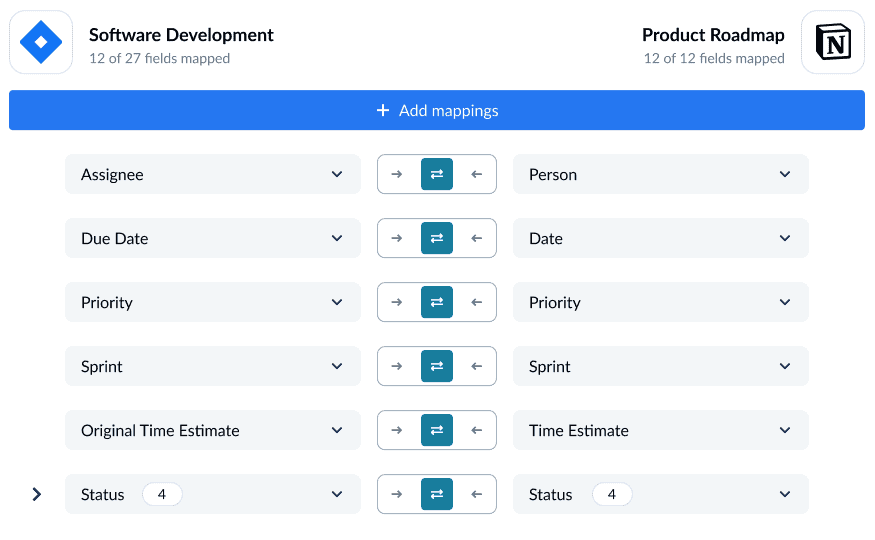Build Better Jira Roadmaps in Tools Like Notion
The product roadmap is the single source of truth for what your development team will be working on for the foreseeable future. Everyone from project managers to marketers and C-suite executives can benefit from an up-to-date, thorough roadmap. But if your software team uses Jira, you might have found its roadmap features to be a bit…lackluster.
So how can you make sure your roadmap is accessible, understandable, and maybe even pleasant to look at?
First: What is a Jira roadmap used for?

A product roadmap is essentially a collection of the individual tasks that need to get completed over a specific period, as represented on a timeline. Multiple teams can contribute work to your roadmap, with main purpose being to share your long-term strategy with external stakeholders — like your c-suite, your board, or your investors.
Jira software has built-in features for displaying issues, stories, epics, and even whole projects on a roadmap.
Second: Why not use Jira’s built-in roadmap?

If you’re a hardcore Jira user, you might balk at the idea of putting your roadmap in any other tool. After all, it’s where your work happens. Why send it anywhere else? Here are three reasons why.
Advanced roadmaps are stuck behind a paywall
Small teams are well-served by the free plan offered by Jira software. You get access to all the essentials, for up to 10 users. Those essentials do include Jira’s roadmaps, though with a few limitations. You won’t be able to pull issues from multiple projects into a single roadmap, for instance. Complex dependencies, team capacity, and multiple roadmap versions are other features you’ll only find in advanced roadmaps offered with Jira Software premium plans.
Some tools are more flexible
Jira is one of the most powerful weapons in a software team’s arsenal. It’s purpose-built for their needs, and it has a host of features that make their lives easier. But even with its many templates, it’s not the most flexible tool out there. Platforms like Airtable, Notion, and Asana give you the ability to build exactly what you need. Something Jira can’t really do.
Other teams don’t use Jira
You’d be hard-pressed to find a marketing team that swears by Jira. The same goes for many other less technical teams. Unless you want to force them into your tool of choice — which rarely goes well — you’ll need to get used to the fact that they use other tools. And if you work with any of them closely, you’ll have to find a way to share your product roadmap without bringing them into Jira.
So, while Jira’s roadmaps are definitely serviceable, there are reasons why you might want to transpose that information into another tool. Convinced? Let’s dive into how you can do this with the right solution.
Syncing Jira issues to a better roadmap tool
With the right integration, you can sync Jira issues seamlessly with another tool. That means any changes made in a Jira issue will be automatically updated in your other tool of choice. This gives you the ability to build dynamic roadmaps in any tool without needing to manually copy and paste information with every update. Notion’s Roadmap template can help:

You can connect this template to Unito and sync with Jira by following this step-by-step guide.
Why Unito is essential for better Jira roadmaps
Unito is far from the only integration solution out there. In fact, Jira already offers native integrations for Trello, GitHub, monday.com, and more.
But many of these integrations only support simple, one-way automations from Jira to the rest of your stack. That’s great for automatically creating new work items across tools, but not so much when you’re trying to build a dynamic roadmap in another tool. Here are just a few ways Unito makes this happen.
One-way create, two-way update

When you build a Unito flow, you can choose how your data will move between your tools. Do you want new work items created in just one direction or both? For a Notion roadmap, you probably don’t want Notion users creating more work for you in Jira. But even if you set up a one-way flow from Jira to Notion, you can still rest easy knowing both tools will be kept updated without any additional work.
Custom fields
Not all integrations can support all the fields you need. Unito’s Jira integration supports the following custom fields:
- Date
- Number
- Single-select dropdown
- Text
No matter how you choose to use Jira, you can trust that Unito’s integration will adapt to your needs.
Advanced mappings

Being able to mold highly customizable tools like Notion to your Jira projects is crucial. Otherwise, you’ll have to do a bunch of manual work to keep your Notion roadmap in line with what people expect to see in Jira. With Unito’s advanced field mappings, you’ll be able to get that same Jira experience in Notion, enhanced by the latter’s customizability.
How Passport Shipping uses Unito for better Jira roadmaps

Passport Shipping uses software, automation, integrations, and more to help e-commerce merchants and marketplaces navigate international order fulfillment. This means their developers are constantly working to find new ways to save their clients money while juggling a complex network of unique fulfillment challenges.
That’s why Ilan Rotenberg, Product Manager at Passport Shipping, uses Unito to sync important Jira issues to Notion. That way, everyone in the business can keep an eye on what’s going on and know where they can help.
